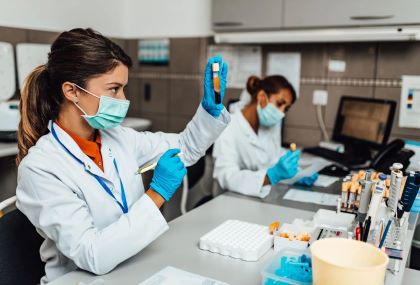
Both technicians and technologists perform tests and procedures that physicians and surgeons or other healthcare personnel order. However, technologists perform more complex tests and laboratory procedures than technicians do. For example, technologists may prepare specimens and perform detailed manual tests, whereas technicians perform routine tests that may be more automated. Medical laboratory technicians usually work under the general supervision of medical laboratory technologists or laboratory managers.
Medical laboratory technologists typically need a bachelor's degree. Lab technicians, on the other hand, only need an associate's degree or a postsecondary certificate. Coursework emphasizes laboratory skills, including safety procedures and lab management, while clinical instruction includes hands-on training in a hospital. After gaining work experience, or subject-specific certification, technologists and technicians may specialize in one of many areas of laboratory science, such as immunology, histotechnology, or clinical chemistry.
Laboratory Techniques and Procedures provides hands-on training in basic and advanced laboratory techniques used in various scientific disciplines. Students learn skills such as sample preparation, microscopy, titration, chromatography, spectrophotometry, and molecular biology techniques like Polymerase Chain Reaction (PCR).
Clinical Laboratory Science focuses on the principles and practices of clinical laboratory science, with an emphasis on medical laboratory testing and diagnostics. Topics covered may include hematology, clinical chemistry, immunology, microbiology, urinalysis, and blood banking. Students learn to perform and interpret diagnostic tests, understand disease processes, and collaborate with healthcare professionals to deliver accurate patient results.
Some states require laboratory personnel to be licensed. Requirements vary by state and specialty. For specific requirements, contact state departments of health, state boards of occupational licensing, or visit The American Society for Clinical Laboratory Science.
Although certification is not required to enter the occupation in all cases, employers typically prefer to hire certified technologists and technicians. The aging population is expected to lead to a greater need to diagnose medical conditions, such as cancer or type 2 diabetes, through laboratory procedures. Prenatal testing for various types of genetic conditions also is increasingly common. Medical laboratory technologists will be in demand to use and maintain the equipment needed for diagnosis and treatment.
Clinical laboratory technologists and technicians can obtain a general certification as a medical laboratory technologist or technician, respectively, or a certification in a specialty, such as cytotechnology or medical biology. Most credentialing institutions require that technologists complete an accredited education program in order to qualify to sit for an exam.
This section offers practice tests in several subject areas. Each of the following multiple-choice tests has 10 questions to work on. No sign-up required, just straight to the test.
Fluid and electrolyte normal values range balance, causes of fluid and electrolyte imbalances, and electrolytes mnemonics, memorization tricks for calcium, magnesium, phosphate, potassium, sodium, and chloride.
There are 8 total blood types from four blood groups (A, B, AB, O). In nursing we transfuse blood, but before we do this we have to collect blood from the patient who will be receiving the blood transfusion. The patient's blood will be typed and crossmatched with a donor. The donor’s blood must be compatible with our patient to prevent a transfusion reaction.
NCLEX questions will test your knowledge about Insulin Lispro (Humalog) and wants to know when the patient is at most risk for hypoglycemia based on the time that he or she was administered medication.
Metabolic panel blood test explained for nurses! This review will discuss the basic metabolic panel (BMP) and comprehensive metabolic panel (CMPT) normal ranges, causes of abnormal results, and your role as a nurse. A metabolic panel blood test assesses: electrolytes, renal function, and liver function. Note: The BMP and CMP both assess the electrolytes and renal function, BUT the CMP also checks the liver function.
Ask yourself if you can see yourself being a lab technician, having daily contact with patients who may be elderly, ill, or recovering from surgery. Other patients may have physical or emotional disabilities, which can be challenging. While classes and internships will prepare you well, certain innate qualities that you bring to bear will help you succeed.
Attending college offers benefits beyond academic learning. Students are exposed to diverse perspectives that challenge their thinking. This fosters problem-solving and communication. College is also about social skills. Whether through student organizations or sports teams, students develop leadership skills and build lasting friendships.
This website is not affiliated with any educational institution, and all trademarks are the exclusive property of the respective owners. All copyrighted works on this website are offered for educational purposes only, governed by the four-factor rule, section 107 of the Copyright Act. CampusInspector.com is the work of a group of students in Bangkok, using data from the US Department of Education, Postsecondary Education Data System (IPEDS). If any information is incorrect, please contact us with updates.